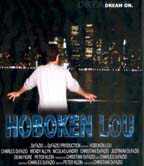In their quest for capturing the reality of living in this small waterfront community, Hoboken Lou, the DeFazio brothers’ feature-length follow up to their award-winning short flick, Little Earth, inadvertently captured a view that no longer exists.
As "Lou LaCascia," the film’s protagonist, stands gazing over the Hudson River at the twinkling lights of Manhattan, the Twin Towers stand boldly intact.
"Between takes I was just kinda standing there and admiring the beauty of that skyline," said Charles DeFazio, the writer and star of the film. "Within a few days after shooting that scene, the towers weren’t there anymore. It created a sense of what’s really important. Nothing, not even the project we were working on, seemed as important, as serious."
Strong words in the world of independent filmmaking, where apprenticeships are marked by long stints of low or no-paid labor and even zealous fervor offers no promise of financial return for well-crafted films starring well-known actors.
"It takes a toll on you and you can only do it one time," explained Christian DeFazio, the film’s director, referring to the process of making an "indie film" with private financing. "You put all your eggs in one basket so you have to make sure you do it right the first time. We’re very happy with our finished project and feel it represents Hoboken really well."
Shot on a Digital Canon XL-1 camera, Hoboken Lou was made as an homage to films of the ’70s like Saturday Night Fever and Rocky. "Where you felt like you were right in the city," DeFazio said. "Most movies today look too clean, too polished. We wanted to give you the feeling like you were hanging out with these guys."
In their efforts to capture the "real" Hoboken, the filmmakers used more than 70 locations throughout town. The sense of reality DeFazio wanted for the script – the story is based on his experiences as a bartender during the 1990’s – was fostered by shooting in the original bar where he worked, East L.A. on Washington Street. While its owner, David Roberts, has since become the city’s mayor, DeFazio had no qualms about calling City Hall to ask his former boss for the favor.
"Basically we marched around town in the couple of weeks leading up to production asking local merchants if we could borrow their restaurants and their bars," DeFazio said. "It was easy to get around to so many locations because the town is so small and people know us, including the merchants."
The DeFazio family has been in Hoboken for at least a few generations. The brothers’ grandfather, Judge Charles DeFazio, made his mark on local politics.
"The town loved him," DeFazio said. "He was born in Hoboken and stayed there his entire life. He used to praise the town when it was at the bottom of the barrel, when it was a seedy place and considered a place to avoid."
The story
It is the legacy of Hoboken’s blue-collar and immigrant heritage that underlies the story’s central conflict, as "Lou" struggles to make his dreams more than that. The film’s website states, "In a town where dreams are rarely pursued, one man refuses to settle for the ordinary." That reflects the frustrations of the long-standing population of Hoboken rather than the more recent influx of affluent professionals and artists, who adopted the town during the boom years.
Mark Bagdanos, who plays a baker named Lupino in the film, goes against the type by playing a man who feels thwarted by life. In real life, Bagdanos remembers what Hoboken was like 25 years ago when he came from Manhattan with his mother at 19 and bought his first bar at 91 Hudson St. for $13,000. Although he came from a poor family, Bagdanos went on to own Arthur’s Steakhouse and the Truck Stop, both of which he sold.
"My character represents a large portion of this community," Bagdanos said. "They had seen so much of the despair of humanity in the waterfront, in the 400 bars that were in Hoboken, in the closing of the companies, that there was no hope."
But, Bagdanos admits, it was the adverse conditions in town that provided the opportunities for success.
"As recessed as it was, it wasn’t a bad place to live," Bagdanos explained. "I [came] to town with nothing but my courage and my mother’s money from the sale of her jewelry to find out whether there was something special inside of me."
That kind of courage – taking your own and your family’s money and investing it in a labor of love – led the DeFazio brothers to their screenings at the New York Independent Film and Video Festival. What the future holds after that in the capricious world of self-financed filmmaking is uncertain.
Was it worth all the years of hard work and the financial risk? "People who don’t follow their dreams don’t have anything," Christian DeFazio said. "That’s how I feel. If you don’t have a dream, you’re not living really."
Hoboken Lou will be screened on Sept. 26 at the Clearview Cinemas at 238 East 59 St. in New York City. Tickets may be purchased by calling Ticketweb at (866) 468-7619 or by visiting their web site at www.ticketweb.com. For more information about Hoboken Lou, visit the film’s web site at www.hobokenlou.com. q
